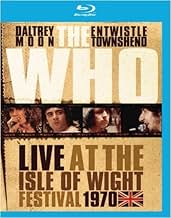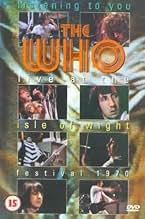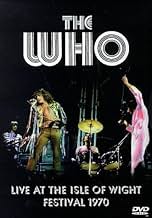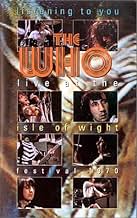Listening to You: The Who at the Isle of Wight 1970
- TV Special
- 1998
- 1h 25m
IMDb RATING
8.3/10
540
YOUR RATING
This is the film of The Who's appearance at the third (and final) Isle of Wight festival in 1970. This is regarded as the band's finest performance.This is the film of The Who's appearance at the third (and final) Isle of Wight festival in 1970. This is regarded as the band's finest performance.This is the film of The Who's appearance at the third (and final) Isle of Wight festival in 1970. This is regarded as the band's finest performance.
Featured reviews
10garjen
Listening to You: The Who at the Isle of Wight Festival (1996)was actually filmed in 1970, 1 year after they had performed at Woodstock. The Who's Rock Opera Tommy was a big hit at this point and they had performed it for over a year. The Isle of Wight concert had 600,000 in attendance and was kind of regarded as the Woodstock of England. The Who supplied their PA system which was the most powerful at the time for all the performing bands to use. I watched this on DVD and was amazed at the video and audio quality. There are great close-ups of Keith Moon going nuts on the drums, John Entwistle's great thundering fingers on the bass, Pete Townshend's windmills, and Roger Daltrey spinning the microphone. Watching this makes you understand why they were regarded as the best live rock band.
What is contained on this disk is a first rate show by a first rate band. This disc is NOT for the faint of heart...the music is incredibly intense, and VERY cool. What you will learn when you watch this movie is just why the Who was so huge for so long. It is true that their records were great, but their shows were the top of the heap. In 1969 when this concert was shot, the screaming teenie boppers that threw jelly beans at the Beatles were gone and bands (and audiences) had settled down to long and often amazing displays of musical virtuosity--something that few audiences have the intellectual curiosity to pursue in the age of canned music by Britney and Christina. What you especially learn here are the amazing things that can happen when gifted musicians are encouraged to improvise. Try the concert out, it really is amazing.
I feel that this is the best Who concert film that I have seen yet. The original Who are all in check, doing various classics like Summertime Blues, I Can't Explain, The Magic Bus and My Generation, each a little different for the good. And, there is a majority of the original Rock opera Tommy, performed soley by the Who in a rare sight (unlike the one in 1989, where it was 3 out of 4 and with guests). Beautiful rock on the small screen by one of the best groups ever. By the way, there is even some unintentional comedy from Keith Moon! A+
The Isle of Wight festival in 1970 is often regarded as one of The Who's finest performances: after almost two years of steady touring behind 'Tommy,' the group was in peak shape, so well-rehearsed and in tune with each other as performers that not even their reckless antics and often bitter interpersonal animosity could undermine their virtuosity as a live act. 'Tommy' made superstars of The Who, but their identity as the inventors of 'rock opera' often obscures the fact that they were also essentially the inventors of punk, and were, at heart, always the thinking man's hard rock band.
'Listening to You' catches The Who at their best, warts and all. The sound mix is typically bass-heavy: guitarist/songwriter Pete Townshend and bassist John Entwistle were perennially at odds over the latter's tendency to play too loud, and though Entwistle was perhaps the group's most inventive and virtuosic instrumentalist, the guitar work is frequently inaudible beneath the bass, which tends to undermine the recording's overall quality. The editing is questionable, particularly for Who purists: director Murray Lerner falls into the typical tendency to place the 'Tommy' sequence at the end of the film, when in actuality it took up the mid-section of the performance. This editorial decision is particularly glaring and nonsensical on the DVD, as it includes an interview with Townshend in which he explains how the group intentionally placed 'Tommy' in the middle of the set so as to capitalize on the mesmerizing effect of its climax to unite the band with the audience for the final act. The camera work is limited to three angles--center-stage, stage-left, and stage-right--and thus lacks the scope of the Woodstock film and other premier rock films of the era such as Martin Scorsese's and The Band's 'The Last Waltz.' In some ways this limits the film, but it also allows for a more direct and authentic impression of what it might have been like to be there.
This is not a 'great concert film' in the same sense as 'Woodstock' or 'The Last Waltz,' but it catches the group at what most of its members considered to be their peak as artists and performers. Murray Lerner wisely includes a great deal of the group's on-stage banter, though a little knowledge of the chaotic nature of the festival--where over half a million fans crowded onto the island and perpetuated the pseudo-revolutionary nonsense of the era by gate-crashing and harassing the performers for the great sin of expecting people to pay for tickets and behave with civility--is necessary to understand the tone of the commentary. Townshend gets in a few good digs at the crowd--introducing live staple 'Young Man Blues,' he remarks 'blues, for the people who paid to get in!'--reminding the contemporary viewer that the Who's irreverence and cynicism extended to idiotic followers of the zeitgeist as well as to the uptight, bourgeois establishment.
There are some glaring omissions--'A Quick One' and 'Amazing Journey/Sparks' most notably--but the disc includes less frequently filmed gems such as 'Water' and 'I Don't Even Know Myself' to make up for the absences somewhat.
For Who neophytes, 'The Kids Are Alright' is probably a better introduction to the group as live performers, but, even given its deficiencies, 'Listening to You' will not likely disappoint anyone interested in the music of the era or the art of live rock performance.
'Listening to You' catches The Who at their best, warts and all. The sound mix is typically bass-heavy: guitarist/songwriter Pete Townshend and bassist John Entwistle were perennially at odds over the latter's tendency to play too loud, and though Entwistle was perhaps the group's most inventive and virtuosic instrumentalist, the guitar work is frequently inaudible beneath the bass, which tends to undermine the recording's overall quality. The editing is questionable, particularly for Who purists: director Murray Lerner falls into the typical tendency to place the 'Tommy' sequence at the end of the film, when in actuality it took up the mid-section of the performance. This editorial decision is particularly glaring and nonsensical on the DVD, as it includes an interview with Townshend in which he explains how the group intentionally placed 'Tommy' in the middle of the set so as to capitalize on the mesmerizing effect of its climax to unite the band with the audience for the final act. The camera work is limited to three angles--center-stage, stage-left, and stage-right--and thus lacks the scope of the Woodstock film and other premier rock films of the era such as Martin Scorsese's and The Band's 'The Last Waltz.' In some ways this limits the film, but it also allows for a more direct and authentic impression of what it might have been like to be there.
This is not a 'great concert film' in the same sense as 'Woodstock' or 'The Last Waltz,' but it catches the group at what most of its members considered to be their peak as artists and performers. Murray Lerner wisely includes a great deal of the group's on-stage banter, though a little knowledge of the chaotic nature of the festival--where over half a million fans crowded onto the island and perpetuated the pseudo-revolutionary nonsense of the era by gate-crashing and harassing the performers for the great sin of expecting people to pay for tickets and behave with civility--is necessary to understand the tone of the commentary. Townshend gets in a few good digs at the crowd--introducing live staple 'Young Man Blues,' he remarks 'blues, for the people who paid to get in!'--reminding the contemporary viewer that the Who's irreverence and cynicism extended to idiotic followers of the zeitgeist as well as to the uptight, bourgeois establishment.
There are some glaring omissions--'A Quick One' and 'Amazing Journey/Sparks' most notably--but the disc includes less frequently filmed gems such as 'Water' and 'I Don't Even Know Myself' to make up for the absences somewhat.
For Who neophytes, 'The Kids Are Alright' is probably a better introduction to the group as live performers, but, even given its deficiencies, 'Listening to You' will not likely disappoint anyone interested in the music of the era or the art of live rock performance.
I saw The Who when the 1982 version of their "final tour" passed through Toronto. While enjoying them immensely, what most sticks in my mind the 20 years and more since is the visual of Roger Daltrey running on the spot a few times, suggesting more than a few ideas that must have been in mind at that time. Here, however, taken from 1970, is a singer and a band musically and visually connected to the music. I doubt that anything of that music and time would have inspired him to be running on the spot. As Huey Lewis would later note and i find it applicable here, judging by a performance like this it would be easy to say that "the heart of rock and roll is still beating." An inspiring performance worth seeing.
Did you know
- TriviaDuring The Who's performance, Pete Townshend makes a comment about "foreigners" coming in and causing problems. Earlier that weekend, a group of French anarchists tried to storm the festival and tear down the iron fence that surrounded the stage area.
- Quotes
Pete Townshend: Smile, you buggers! Pretend it's Christmas.
Details
Contribute to this page
Suggest an edit or add missing content



























